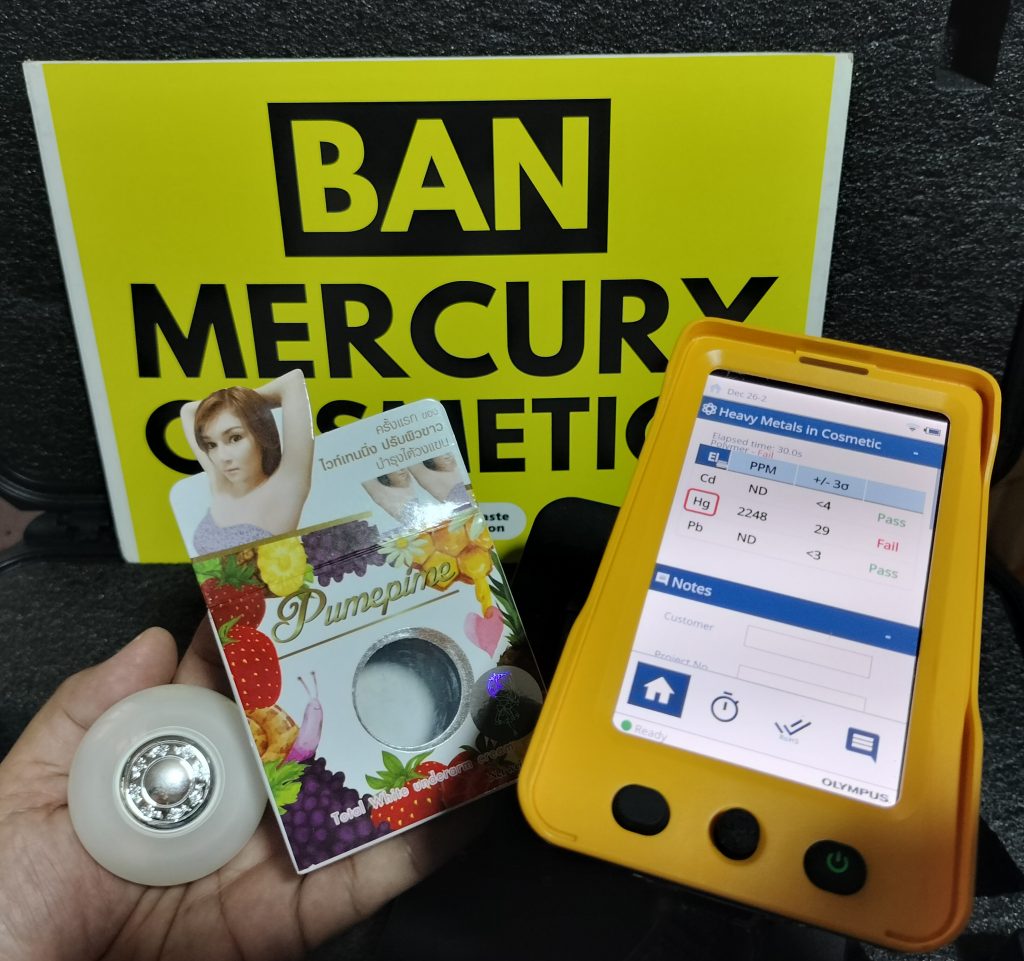
QUEZON CITY — As 2024 winds down, the toxics watchdog group EcoWaste Coalition revealed it has detected mercury, a dangerous chemical not permitted in cosmetics, in a product for whitening the axilla or what is commonly referred to as the armpit or underarm.
Based on the chemical screening conducted by the group, “Pumepine Total White Underarm Cream” contains 2,248 parts per million (ppm) of mercury, which exceeds the one ppm maximum limit for mercury as a heavy metal contaminant under the ASEAN Cosmetic Directive.
Pumepine is the latest underarm whitening cream found contaminated with mercury by the EcoWaste Coalition. Previous investigative efforts by the group also found 88 Total White Underarm Cream, Snow White Armpit Whitening Underarm Cream, and Q-nic Care Underarm Whitening Cream tainted with violative levels of mercury.
“We are shocked to find another underarm whitening cream adulterated with mercury that is illegally being peddled online,” said Aileen Lucero, national coordinator, EcoWaste Coalition. “Customs, health and trade regulators, together with the administrators of e-commerce and social media platforms, must take concerted action to ensure that adulterated products such as those loaded with mercury are effectively blocked from entering the marketplace and poisoning our people.”
The group bought the item from an online seller for P381. It has no market authorization from the Food and Drug Administration (FDA) of the Philippines.
According to the labeling information in English and Thai languages, the product “reduces body odor while providing whiting (sic) effect and smooth skin tone.” The product also claims to “reduce chicken skin” or what doctors call “keratosis pilaris.”
Despite lacking the required market authorization and its obvious non-compliance with the mercury ban in cosmetics, the product is deceptively marked “FDA Approved” and “GMP Certified” (GMP stands for “Good Manufacturing Practices”).
As indicated on the label, the product was manufactured in 2024, way beyond the 2020 global phase-out deadline on the manufacture, import, or export of certain mercury-added products, including cosmetics such as skin-lightening products.
Exposure to the inorganic mercury in skin-lightening products, according to the World Health Organization (WHO), may result in kidney damage, skin rashes, discoloration and scarring, reduced skin’s resistance to bacterial and fungal infections, as well as lead to anxiety, depression, psychosis, and peripheral neuropathy.
“Mercury in soaps, creams, and other cosmetic products is eventually discharged into wastewater,” the WHO warned. “The mercury then enters the environment, where it becomes methylated and can enter the food chain as highly toxic methylmercury in fish. Pregnant women who consume fish containing methylmercury can transfer the mercury to their fetuses, which can result in neuro-developmental deficits in the children,” the WHO further said.
To avoid mercury contamination of the human body and the ecosystems, the EcoWaste Coalition reiterated the need for consumers to accept their natural skin tone and to reject chemical whiteners, stressing that “all colors are beautiful, and should be respected and not discriminated upon.”
Last August, the group wrote to FDA Director General Samuel Zacate to propose a multi-stakeholders summit to forge an agreement towards a whole-of-society approach to stop the persistent trade of mercury cosmetics and to develop solutions and actions that will disable and end such unethical and illicit trade.
Reference:
https://www.who.int/publications/i/item/WHO-CED-PHE-EPE-19.13
https://ecowastecoalition.blogspot.com/2024/08/toxics-watchdog-group-pushes-for-fda.html
